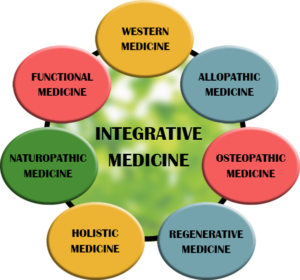Exploring Integrative Medicine and the Power of Complementary Therapies
In recent years, there has been a growing interest in integrative medicine and complementary therapies as people seek holistic approaches to health and wellness. Integrative medicine combines conventional medical treatments with evidence-based complementary therapies to promote healing and overall well-being. In this blog post, we’ll delve into the principles of integrative medicine, explore some common complementary therapies, and discuss how they can support physical, mental, and emotional health.
Understanding Integrative Medicine:
Integrative medicine takes a holistic approach to health, recognizing the interconnectedness of the body, mind, and spirit. It emphasizes the importance of addressing the root causes of illness and disease, rather than just treating symptoms. Integrative medicine practitioners take into account a person’s unique health history, lifestyle, and preferences when developing treatment plans, incorporating both conventional medical treatments and complementary therapies to promote healing and wellness.
Common Complementary Therapies:
- Acupuncture: Acupuncture is a traditional Chinese medicine practice that involves inserting thin needles into specific points on the body to stimulate energy flow and promote healing. It is commonly used to alleviate pain, reduce stress, and improve overall well-being.
- Massage Therapy: Massage therapy involves manipulating the soft tissues of the body to relieve tension, reduce pain, and promote relaxation. It can be beneficial for treating muscle pain, stress-related tension, and certain medical conditions such as arthritis and fibromyalgia.
- Herbal Medicine: Herbal medicine uses plant-based remedies to prevent and treat various health conditions. Herbs are often used in the form of teas, tinctures, or supplements and can be beneficial for supporting immune function, reducing inflammation, and improving overall health.
- Mind-Body Practices: Mind-body practices such as yoga, tai chi, and meditation combine physical movement with mindfulness and breath awareness to promote relaxation, reduce stress, and enhance overall well-being. These practices have been shown to improve mental clarity, emotional resilience, and physical health.
Benefits of Integrative Medicine and Complementary Therapies:
- Holistic Approach: Integrative medicine takes into account the whole person, addressing physical, mental, and emotional aspects of health and wellness.
- Personalized Care: Integrative medicine practitioners develop individualized treatment plans tailored to each person’s unique needs, preferences, and goals.
- Enhanced Well-Being: Complementary therapies such as acupuncture, massage therapy, and mind-body practices can support physical, mental, and emotional health, promoting overall well-being and quality of life.
- Reduced Side Effects: Many complementary therapies have fewer side effects than conventional medical treatments, making them suitable for individuals seeking natural and gentle approaches to healing.
Integrative medicine and complementary therapies offer holistic approaches to health and wellness, combining conventional medical treatments with evidence-based complementary therapies to promote healing and overall well-being. By addressing the root causes of illness and taking into account the interconnectedness of the body, mind, and spirit, integrative medicine empowers individuals to take an active role in their health and achieve optimal wellness. Whether used alone or in conjunction with conventional medical treatments, complementary therapies can support physical, mental, and emotional health, helping individuals live happier, healthier lives.
This blog post explores the principles of integrative medicine and the power of complementary therapies in promoting holistic health and wellness. It discusses common complementary therapies such as acupuncture, massage therapy, herbal medicine, and mind-body practices, highlighting their benefits for physical, mental, and emotional well-being. Integrative medicine offers personalized, holistic approaches to healing, empowering individuals to take control of their health and achieve optimal wellness.

